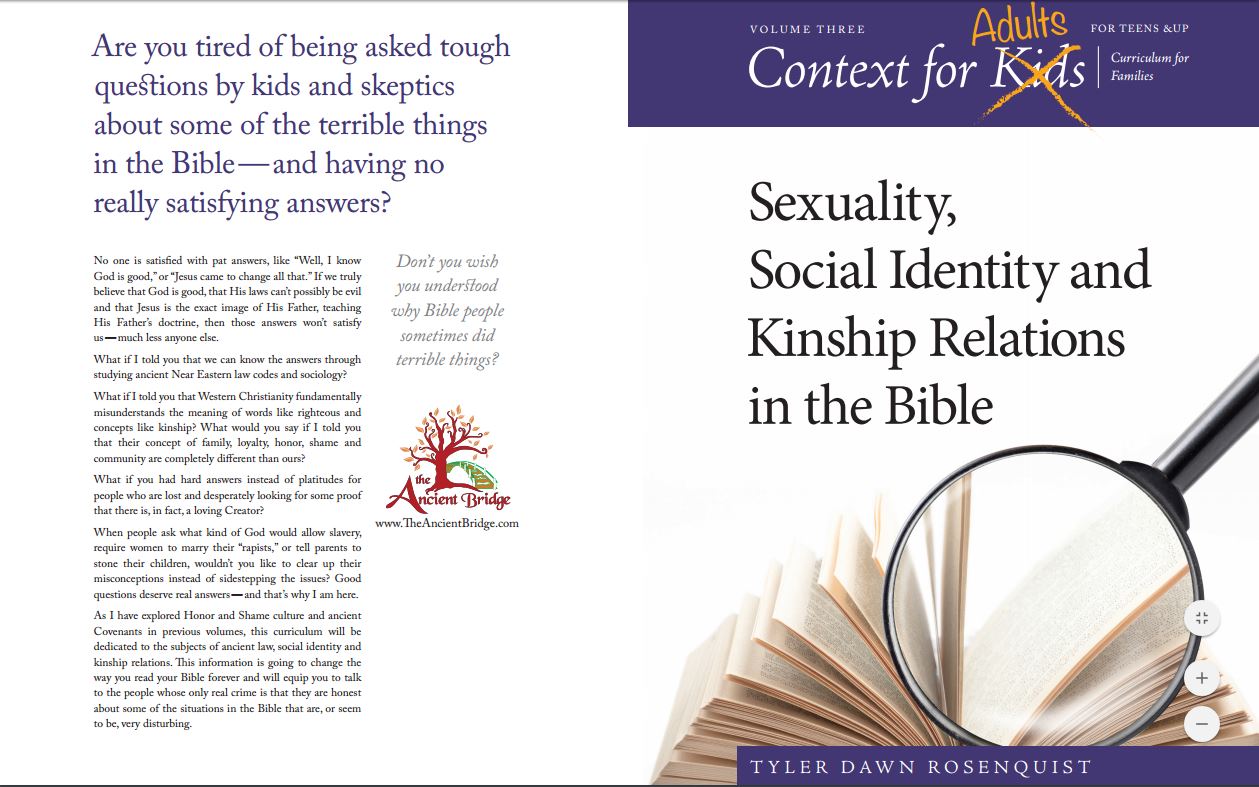I had to choose a chapter that could largely stand on its own, so I went with “Lesson 39 – If Moses Allowed Divorce, Why Did Jesus Call Remarriage After Divorce Adultery?” The other lessons required a good working knowledge of group social dynamics, which I spend the first ten lessons teaching in depth, but this one only really required a knowledge of the first-century controversy in question – that of “any cause” or “every cause” divorce. Hopefully, we will have this book on the market in about a month. Just polishing it up!
**************
 Without context, the Bible can be used to do terrible harm to people. In this case, we are going to need to talk about three sections of Scripture that have been misused because of translational problems as well as a lack of knowledge concerning the “any cause” divorces of the first century. First, let’s look at the three sections of Scripture in question:
Without context, the Bible can be used to do terrible harm to people. In this case, we are going to need to talk about three sections of Scripture that have been misused because of translational problems as well as a lack of knowledge concerning the “any cause” divorces of the first century. First, let’s look at the three sections of Scripture in question:
Deut 24:1-2 “When a man hath taken a wife and married her, and it come to pass that she find no favour in his eyes, because he hath found some uncleanness in her: then let him write her a bill of divorcement, and give it in her hand, and send her out of his house.
And when she is departed out of his house, she may go and be another man’s wife.”
Matt 5:31-32 “It hath been said, Whosoever shall put away his wife, let him give her a writing of divorcement: But I say unto you, That whosoever shall put away his wife, saving for the cause of fornication, causeth her to commit adultery: and whosoever shall marry her that is divorced committeth adultery.”
Matt 19:3-9 “The Pharisees also came unto him, tempting him, and saying unto him, Is it lawful for a man to put away his wife for every cause? And he answered and said unto them, Have ye not read, that he which made them at the beginning made them male and female, And said, For this cause shall a man leave father and mother, and shall cleave to his wife: and they twain shall be one flesh? Wherefore they are no more twain, but one flesh. What therefore God hath joined together, let not man put asunder. They say unto him, Why did Moses then command to give a writing of divorcement, and to put her away? He saith unto them, Moses because of the hardness of your hearts suffered you to put away your wives: but from the beginning it was not so. And I say unto you, Whosoever shall put away his wife, except it be for fornication, and shall marry another, committeth adultery: and whoso marrieth her which is put away doth commit adultery.”
As we learn from the Babylonian Talmud, in Gittin 90a, during the first century BCE the House of Hillel Pharisees enacted a ruling stating that a man could divorce his wife for any cause. Although the intent of Deuteronomy 24 was clearly to allow divorce in the case of adultery, aka “uncleanness,” Hillel expanded that ruling to allow a man to send his wife out for the smallest of offenses – even if she merely burned his meal. As you can imagine, based upon what we have learned so far, this left a wife in a terrible predicament. Even if her husband paid the ketubah money owed with a divorce, it would only last so long and women in those days could rarely find respectable work. So what question was Jesus really being asked?
“Do we (men) have the right to divorce our wives for any reason whatsoever? Do you agree with Hillel’s ruling?”
The answer was undoubtedly not what many of them wanted to hear. Tragically, divorce had become rampant in the time of Jesus – not a mutual divorce as we see in modern times, but a one-sided affair where a woman had absolutely no say. Men had gotten used to having absolute power over their women, and they were using the Bible as their justification. The Bible certainly permitted divorce based on a breach of the marriage covenant, but not over trivialities.
How did Jesus reply?
“God created marriage to be eternal, and when you send your unemployable wives out into the world shamed and without support over insignificant issues, God is not going to see your actions as justified. She is going to be forced to remarry to survive, but as far as God is concerned, you didn’t divorce her legally, and so her adultery is your crime as she is still your wife and your responsibility; this was not her choice. And the guy she marries? He is going to be involved in adultery too – because your callous, selfish decision made a terrible mess.”
What Jesus is addressing here was just one aspect of the systemic societal evil in the first century. Was divorce allowed under the Law? – Yes, absolutely. Was remarriage after divorce allowed? – According to Deut 24, yes. Was “any cause” divorce acceptable? – Absolutely not. There is nothing righteous about treating your wife like she is not your family, throwing her out of the house without her having any say in the matter when she is not an adulteress. The Matthew texts make it clear that a marriage cannot have a one-sided dissolution. It isn’t over until both sides say it is over or until one side destroys that bond through sexual sin. One partner walking away does not unilaterally sever the covenant bond without their spouse’s permission. Modern divorce is, in some ways, more like the Biblical model – despite the fact that we still divorce far too easily. One person can’t just decide that the marriage is over – it has to be a mutual decision (or at the very least, it can be contested), ratified in the courts, in order for the petitioner to remarry. First-century men, however, were casting their wives aside and taking on new brides – whether their wives approved or not. This was considered adultery – as their wives rights in the matter were being taken into account, by God.
There is a reason why sexual relations in the Bible are so often referred to as “humbling” a woman – that humbling is not necessarily evil or bad, but to have one’s way with a woman and then abandon her leaves her feeling violated and demeaned. Marital sexual relations, on the other hand, should leave a woman feeling valued and loved. There is a humility that exists between a man and a woman after sex, a humility that can either result in healthy intimacy or destructive shame. God’s intention was for sexual intimacy to bind a man and a woman together honorably for life, not to give them cause for regrets, embarrassment, and feelings of abandonment and betrayal.
Women were created to be extremely emotionally vulnerable to rejection, and any study into honor/shame dynamics will verify that a woman’s reputation is far more easily damaged than a man’s, and is not easily recovered even if she is later found to be innocent. To be thrown out of her home by her husband merely because she is no longer attractive, or because he is tired of her, or becomes interested in someone younger, strikes at the heart of a woman’s basic sense of self-worth. It is the epitome of what it means to be unloving to one’s neighbor. Even knowing that her husband could legally abandon her, seemingly with the blessing of God, would have been a cause for much stress in the life of any married woman.
I want you to notice what Jesus didn’t say, “Any of you who have married a divorced woman now need to divorce her, or you are sinning.” He said nothing of the sort, or even hinted at it. New marriages produce children, and God is in no way honored when yet another home is broken apart. Frequently, Jesus addressed the real core problem without presenting a solution because there was no longer any good solution except – “don’t do this anymore.” Jesus was telling them that “any cause” divorce was not justified in the eyes of God and that they needed to start honoring the marriages they were in now. “Any cause” divorce was unjust, cruel, and arbitrary – making each man a potential tyrant in his own home, and his wife little more than an expendable slave subject to the whim of her master.
Homework: In Ten Commandments and the Covenants of Promise, I taught a character lesson about being true to one’s marriage covenant partner. As we discussed, Hillel said that divorce should be permitted even if your wife burns a meal, but Shammai recognized that a covenant between people cannot exist if there is no expectation of forgiveness. When a woman marries a man, she needs to know that as she gets older, he will remain true to her. She needs to know that doing her best will always be enough. The same goes for wives with their husbands; we must be loyal to each other unless there is an actual betrayal. My husband and I have been married for twenty-six years, and neither one of us is getting any better looking! I want you to imagine a world where your spouse had the legal authority to hand you a sheet of paper in front of witnesses and walk out the door (or rather, push you out the door) in a society without child support, where a woman had no honorable professional opportunities and whose family might not want the shame of taking her back in. How would that reflect upon your understanding of the nature of God’s covenants? Would you trust Him that forever means forever, or would you think that He is capable of abandoning His own covenant people? Would “Great is Thy Faithfulness” ever have been written if we thought He wasn’t long-suffering?





















This is so good, and right on. I would take issue with one thing, which has little or no affect on the broader article; marriage today is a one sided affair. A man can divorce his wife without he agreement; and a wife can divorce her husband, no matter how much he wants to remain with her. That being said, this article hits all the right tones and brings this often misunderstood topic into context.
Ah yes, did some digging and the law has indeed changed – one spouse alone can file and divorce. I do see, however, that even with a “no fault” divorce, the other spouse can contest the terms. The “no fault” simply greases the wheels of “justice” and makes the divorce go easier – in this, it is still entirely more humane than first-century divorce where, sadly, the woman didn’t even have the power to contest. I am sorry to see the laws have changed. Thanks for the heads up!
I tweaked it to reflect our current reality, thanks so much for that!
Spot on! thank you! The article triggered some thoughts
Tragically, for many of my dear aunts this was their story. After decades of marriage to unfaithful men they were left dangling like cheap earrings. Sadly, till this day some of them remain bitter.
On a more cheery note, I got a real chuckle when reading the line about ‘you & hubby not getting any better looking after 26 years of marriage’.
There’s something to be said about marrying younger! Hopefully you could look back and remember a time when you were decidedly better looking. I saw a profile pic where you & husband appear as quite the lookers 😁
After 26 years of marriage – with the predictable bumps along the way – there is bound to be some wear & tear but more importantly, you’re likely to have a stronger relationship & a deeper appreciation for one another than u did on your honeymoon
My mother’s favorite saying has long been,’love is blind but marriage restores your sight’
I take that to mean we choose to love in spite of,we work through the issues with eyes fully open and we resolve that this covenant relationship is worth the work, till death does us part.
I hope you enjoy at least 50 more years of wedded bliss w your beloved! Just Imagine how much better looking y’all be then!
Thank you! And who can blame their bitterness – what an injustice to be treated in such a way. I am grateful that we serve a King who is so compassionate as to put the guilt where it belongs – on the man who created the mess, and that He does not require abandoned woman to be forever alone. We live in such a mess of a society that sometimes there is no good solution, but that God places the weight of sin on the person who created the situation and not those who are left to pick up the pieces as best they can.
Thank you, this answered some questions for me. I still have a couple, maybe you can help. In today’s society, after a divorce, is remarriage still adultery? And what does that mean for pastors that perform remarriages (if it is), or refuse till (if it’s not)? Thanks!
This wasn’t just a mutual divorce, this was men unilaterally giving their wives a divorce without the wife’s consent. In that case, unless the wife was guilty of indecency, the divorce was not acceptable in God’s eyes and so they were not actually divorced as far as God is concerned. In that case, if he remarried again, he was committing adultery – and if she remarried again, he was the only one guilty of her “adultery” – because he left her in a no-win situation and that type of divorce is not acceptable to God. She wasn’t committing a willful sin, she was left in a situation where she had no other option. God was telling men that they didn’t have the God-given right to divorce for “any cause” – that was the entire thrust of the situation. If a couple agreed mutually to divorce, then no one is still legally married in God’s eyes, as I see the situation. Our hearts are hard, and so God allows divorce – but it has to be a mutual decision and not one partner forcing it on an innocent party (although a partner can, in fact, force it on a guilty party and have it be valid). Jewish law, in the time of Messiah, actually also allowed a woman several reasons where she could legitimately get a divorce from her husband, due to his behavior. But these Scriptures only really address the “any cause” divorces of the post-Hillel Phariseeism. It was never meant to make blanket statements about all divorces in general.
Thanks for this article, it really helped answer a lot of questions.
A friend left an abusive marriage a number of years ago. Her husband is was the local pastor. It was so abusive he is still imprisoned. The Christian community rallied and supported her at the time. Now however she would like to date. There are those that cry that she can never remarry since it wasnt adultry that separated them. What resources can i share with her/ them?
Here you go, by one of my favorite scholars https://www.amazon.com/Marries-Another-Remarriage-Teaching-Testament/dp/0801046742